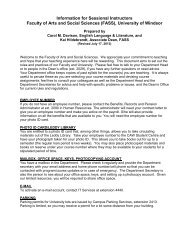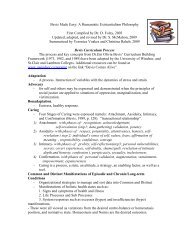No Exit: Racial Profiling and The War Against Terrorism
No Exit: Racial Profiling and The War Against Terrorism
No Exit: Racial Profiling and The War Against Terrorism
You also want an ePaper? Increase the reach of your titles
YUMPU automatically turns print PDFs into web optimized ePapers that Google loves.
41 OSGHLJ 293 Page 12<br />
41 Osgoode Hall L.J. 293<br />
Increases in public suspicion of Arabs <strong>and</strong> Muslim in Canada are undoubtedly spurred by the rising anti-Arab animus<br />
in the United States. In the weeks following 9/11, the United States Commission on Civil Rights set up a hotline to<br />
h<strong>and</strong>le claims of discrimination <strong>and</strong> harassment. Shortly after the hotline's installation, the number of calls reached approximately<br />
seventy per hour. [FN98] <strong>The</strong> FBI reported that anti-Muslim hate crimes rose by a dramatic 1,600 per cent<br />
between 2001 <strong>and</strong> 2003. [FN99] Louisiana Congressman John Cooksey perhaps best expressed Arab- <strong>and</strong> Muslim-phobia<br />
in the *316 United States when made the following remarks in a in a state-wide radio address.<br />
<strong>The</strong> terrorist had a different look, a different face .... If I see someone (who) comes in that's got a diaper on his<br />
head <strong>and</strong> a fan belt wrapped around the diaper on his head, that guy needs to be pulled over ... [FN100]<br />
Those people who argue in favour of profiling on the basis of nationality or citizenship as opposed to race tend to<br />
miss the connection between profiling <strong>and</strong> hate crime. [FN101] True, there is an important legal distinction to be made<br />
between nationality or citizenship <strong>and</strong> race in some context. For example, section 6 of Charter limits mobility rights to<br />
citizens. However, this distinction in the context of the war against terrorism appears rather flimsy because national profiling<br />
still requires that individuals from a certain racial group remain the focus of scrutiny <strong>and</strong> suspicion. [FN102] As<br />
the Supreme Court of Canada has said in another context: Whether all members of the group attract special scrutiny<br />
proves irrelevant just as pregnancy discrimination constitutes gender discrimination regardless of whether all women are<br />
subject to it. [FN103] National profiling is still racial profiling, albeit in allegedly scaled down form, <strong>and</strong> there is no reason<br />
to assume that ethnic profiling will be any less implicated in a cycle of hate <strong>and</strong> stereotyping than racial profiling of<br />
Arabs <strong>and</strong> Muslims regardless of citizenship.<br />
To some people, the harms faced by individuals may be justified as an appropriate price to pay in the <strong>War</strong> against<br />
<strong>Terrorism</strong>. Indeed, the harms may appear insignificant in relation to the objective of fighting terrorism. However, consequences<br />
that may appear insignificant when viewed in isolation or from an abstract individual perspective become<br />
deeply problematic when viewed from a community perspective of systematic exclusion. [FN104] <strong>Racial</strong> profiling fuels<br />
the conviction that Arabs <strong>and</strong> Muslims represent the foreigner within, regardless of their citizenship *317 status. [FN105]<br />
<strong>Racial</strong> profiling excludes Arabs <strong>and</strong> Muslims from “those who are imagined by the community as belonging to the community.”<br />
[FN106] “<strong>The</strong> subtext is that Muslims are a foreign element, aliens ... with no tenure to citizenship, that they<br />
are here as sleeper terrorists ....” [FN107] Ultimately, the relationship between racial profiling <strong>and</strong> racism casts serious<br />
doubt on both the wisdom <strong>and</strong> efficacy of racial profiling as an arsenal in the <strong>War</strong> against <strong>Terrorism</strong>.<br />
V. CONCLUSION<br />
<strong>Racial</strong> profiling represents a quest for simple answers to immensely complicated questions. Unfortunately, there are<br />
no easy ways to prevent terrorism. [FN108] We will continue to live with some level of uncertainty in a post 9/11 world,<br />
perhaps reaffirming Jean-Paul Sartre's claim that “hell is other people.” [FN109] Yet, those who turn to racial profiling<br />
as an anecdote for uncertainty will find neither solutions nor comfort. <strong>Racial</strong> profiling will produce only illusions of security<br />
while heightening the disempowerment <strong>and</strong> sense of vulnerability of racialized groups in Canada. <strong>The</strong>re is no exit.<br />
[FNa1]. AssistantProfessorofLawattheUniversityofWindsor.Hermainareasofresearchincludeaccesstojustice,international<br />
law, <strong>and</strong> feminist legal theory. She will be a visiting research scholar at the University of Michigan in 2003<br />
where her work will focus on Security Council Resolution 1325. <strong>The</strong> author would like to thank Paulette Pommels for<br />
her outst<strong>and</strong>ing research assistance <strong>and</strong> helpful comments on earlier drafts of this article.<br />
[FN1]. Jean-PaulSartre,<strong>No</strong> <strong>Exit</strong>, Four Contemporary French Plays, trans.byStuartGilbert(NewYork:R<strong>and</strong>omHouse,<br />
© 2010 Thomson Reuters. <strong>No</strong> Claim to Orig. US Gov. Works.





